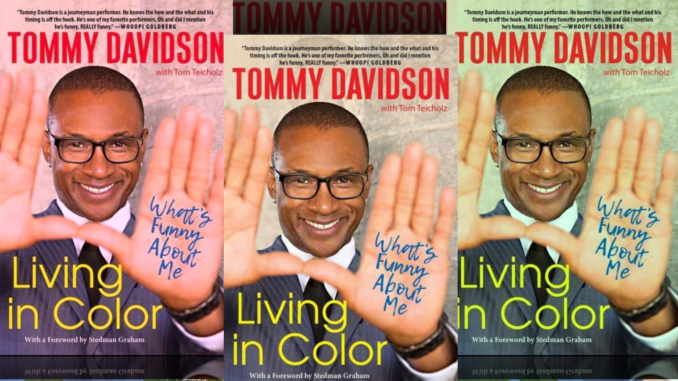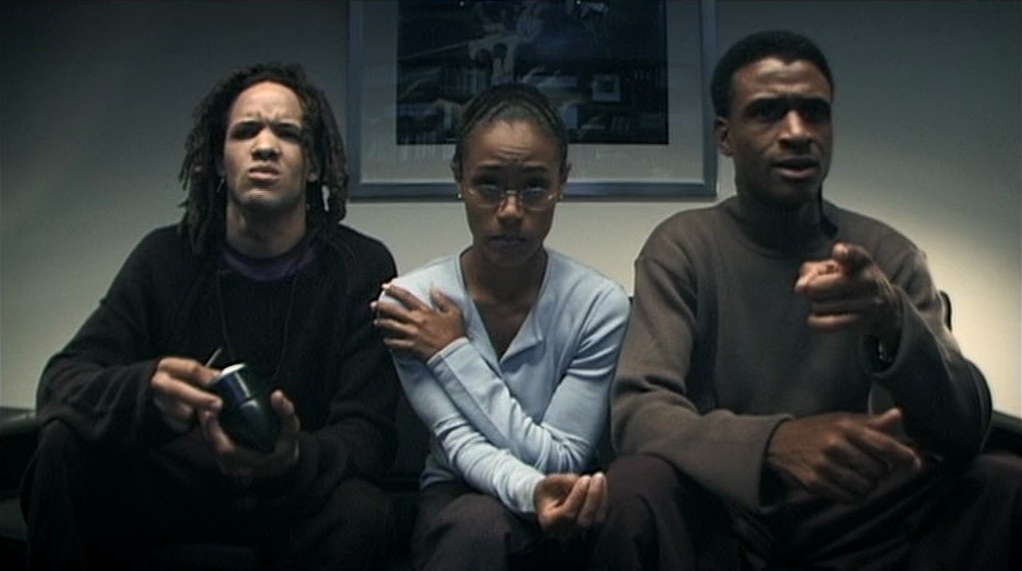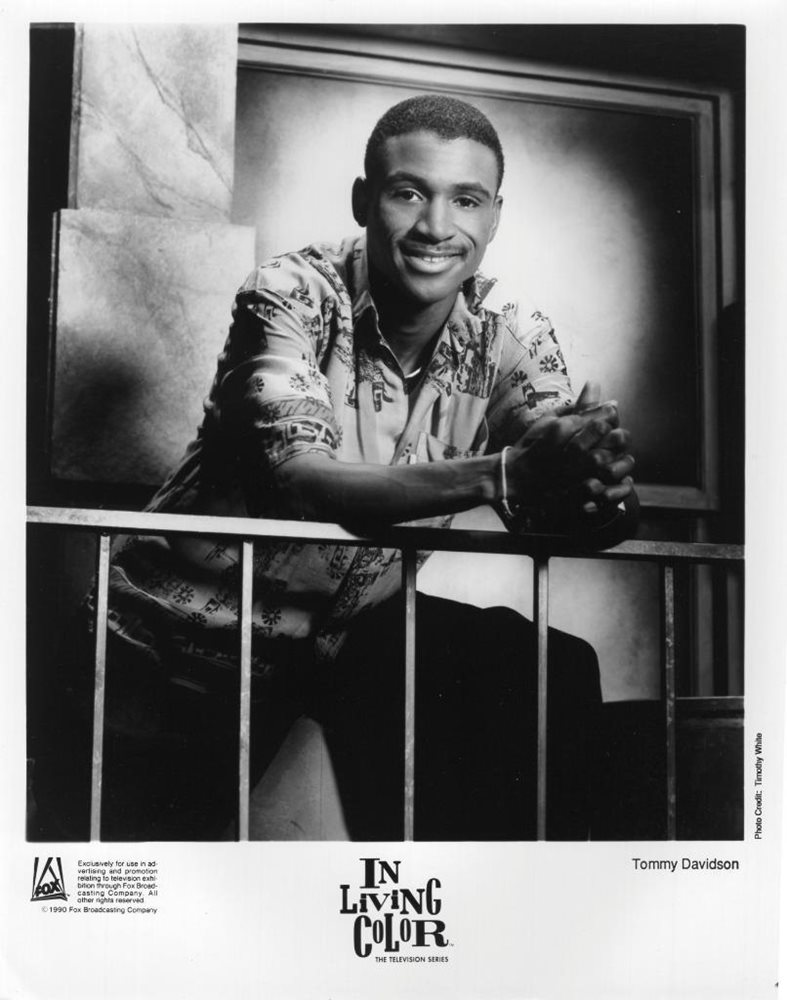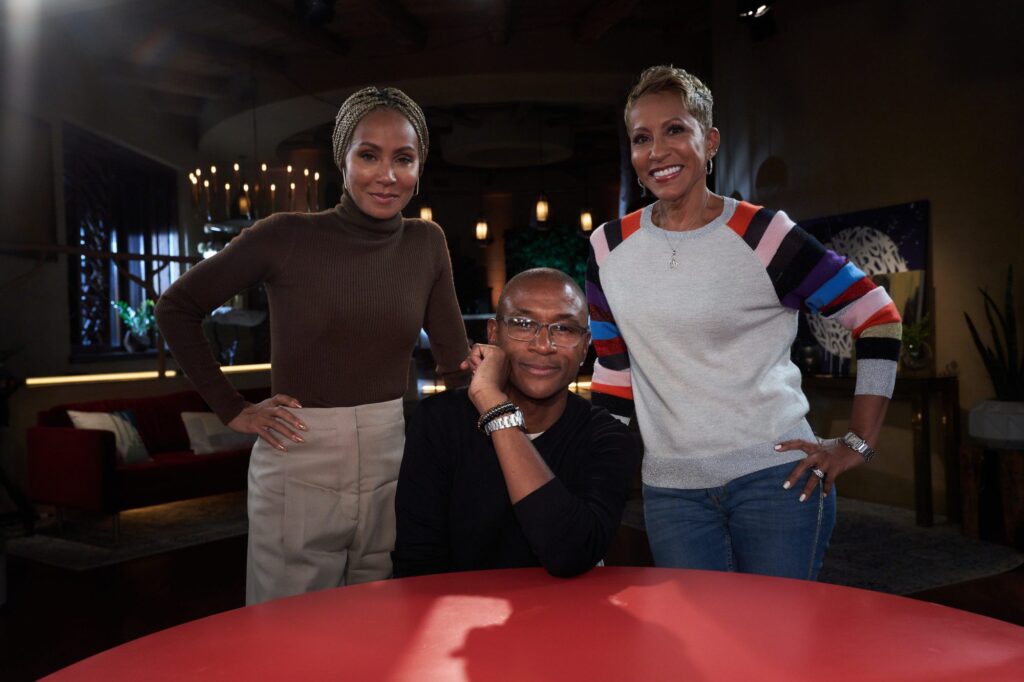
Tommy Davidson as the comedian, was birthed during a comedy renaissance in the 1990s that was ignited by the likes of Richard Pryor, Bill Cosby, Dick Gregory, Redd Foxx, Robin Harris, Paul Mooney, Eddie Murphy, and so many more. The Washington D.C. comic’s ascension from a trained chef to a movie star is a testament to his various talents, including stand-up, singing, dance, and acting.
He’s starred in cult classic films, Booty Call, Bamboozled, and Juwanna Mann, and has appeared on the legendary, game-changing television series, In Living Color, The Proud Family, and Black Dynamite. With a career that spans four decades still in motion, Davidson has imparted his wisdom in his autobiography, Living In Color: What’s Funny About Me.
Although the novel has been on the market for a while now, releasing in 2020, Living In Color is easily one of those books that can be revisited time and time again. In it, readers will learn about Davidson’s harrowing story as an abused child discovered in the trash in Greenville, Mississippi, and his subsequent journey into the realms of Hollywood.
There’s also the interesting stories about his work relationship with Keenan Wayans, on-set contention with Jamie Foxx, and once-blossoming friendship with Halle Berry. Story after story, Davidson keeps readers entertained and informed, making for one great selection for our segment, The MouthSoap Book Lurking.
Here are seven lessons we picked up from the good (and juicy) read:
Love It Or Leave It

In a capitalistic society, the driving force for many falls into three categories: money, material, and ego. When those factors are the foundation of your pursuits, the inevitable tends to happen. Let the going get tough and some people will quit, others dig themselves deeper holes by self-medicating in unhealthy ways. Davidson has a very simple philosophy when pursuing a career in entertainment, or almost anything really.
“Only do it if you really love it. If you’re getting in it for the money, for the prestige, or for the fame, those perks go up and down, day to day, and year to year. Someone’s always going to be more famous than you, always have more prestige than you, make more money than you. But love for something doesn’t change, so love it. Love it so that you can love the whole process.” (p.236-237)
Be About Your Business

The grind wasn’t easy for Davidson. When he first step foot in Hollywood, he came with a plan devised by his business manager at the time. For three years, the Washington D.C. native worked at the post office during the day and circulated the comedy clubs at night. He admits that “it was a tough and, at times, monotonous routine,” but being about his business worked out in the long-term.
“Our motto was to get it done and leave. I didn’t drink, and I didn’t smoke, and I didn’t do drugs. Days when I wasn’t working at a job, I’d be working on my material at the house. My mandate was to hit as many clubs as I could and go home. Sinclair taught me that discipline…I’m a bad motherf*ck* for a reason. He worked my f*ckin’ a** so hard, I started to wonder, Why am I doing this?” (p. 47)
The Pros Pay Attention To Detail

Davidson learned the value of paying attention to details during his time on the In Living Color set playing opposite Jim Carrey. The two comedians worked together on the Fire Marshal Bill segment, a character created by Carrey that focuses on fire safety, all at the detriment of himself. Carrey was a consummate perfectionist and he would take hours to complete his sketches, according to Davidson. What resulted was one of In Living Color’s most beloved characters.
“…Jim taught me the value of being ultra attentive to every single detail. Jim Carrey is not a success because he is funny. Jim Carrey is a success because his process is to troubleshoot every single aspect of what he does.” (p. 121)
What Goes Up, Must Come Down

It never seems to fail that when rising stars emerge in any field, whether that be the silver screen or a traditional 9-to-5, they don’t realize that this too shall pass. What was before may eventually be no more, so it’s always better to be gracious, merciful, and tactful in your dealings. Burning bridges may be necessary. Confrontation may be inevitable. However, always keeping in mind that if you live long enough your time at the top will eventually fade and some new sensation will be all the rage will be a benefactor for motivating work ethic and humility. It will also provide protection from being detrimentally affected by change.
Davidson puts it best, “I have learned, the hard way, that a show business career where competition is king will suck the pleasure out of doing what you love and will make the entertainment business into a personal hell. When your comet comes, you just have to be ready to ride the damn thing. And when the comet passes, you just keep on keepin’ on, doing your work.”(p.239)
Don’t Play Head Games
Even as a superstar comedian, Davidson had moments when he doubted himself. One of his darkest moments occurred at a hotel in Amsterdam where he was extra hard on himself for not currently being on a TV series. He writes, “No one knew who I was; no one cared about the work I’d done, and the work I could do.” In the midst of these ideas running through his head, he turned on the TV to find one of the episodes of Martin that featured him playing the character Varnel Hill.
The infamous 1993 episode, “Hollywood Swinging,” showed the character played by Martin Lawrence competing with Varnel, a person he came up with who had hit it big. At first, Martin was jealous of Varnel’s success, but that soon turned to admiration and a desire to have Varnel’s lifestyle. When he asked Varnel what his secret to success was, he responded, “You gotta have faith, man.” Davidson took the episode showing in the hotel room that day as a blatant sign from the universe, bringing him back to his center.
“Do your work; don’t complain; don’t play the head games where you compare yourself to anyone else. Because if you let it, that sh*t just turns around on you.” (p. 171)
Surround Yourself With Talent
Davidson recalls, “Keenen [Wayans] learned a lot from Richard’s [Pryor] example about doing a variety show. The most important thing he learned was talent potential. Keenen understood how to play talent forward, how to stack a backfield with talent…He had Bill Belichick sh*t going on. That is one of the reasons In Living Color was as good and as fresh as it was.” (p. 69)
Some of the greatest people, companies, and teams have made this play. There are those who want to be the only star player in the room, and that’s feasible for some. However, surrounding yourself with people smarter or better than you will make you that much better. Better yet, “Putting people on” will give you a legacy that transcends time.
Be Like Frozen And Let It Go
A comedy special deal with Viacom’s Comedy Central didn’t come to fruition at no fault of Davidson. It was a major upset for him and eventually led to him parting ways with Barry Katz, his business manager at the time. Davidson’s takeaway:
“Business is like the Karma Sutra. There are ten thousand ways to get f*cked, and each one of them is different…If I learned anything from the experience, it’s that there’s no point in carrying around disappointment and anger. Holding on to that did nothing good for me.” (p. 223-224)




